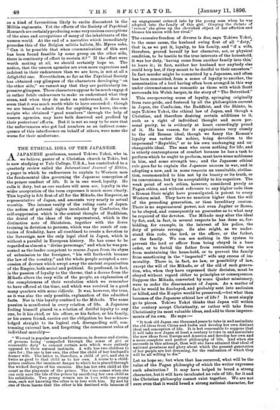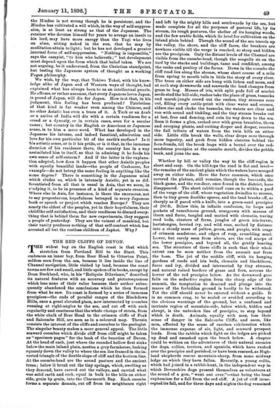A THE ETHICAL IDEA OF THE JAPANESE. JAPANESE gentleman, named Tokiwo
Yokoi, who is, we believe, pastor of a Christian church in Tokio, but is now studying at Yale College, TJ.S.A., has contributed to a quarterly review called the International Journal of Ethics,
a paper in which he endeavours to explain to Western men the fundamental idea governing the Japanese conception of the proper conduct of life. It is in one word, loyalty. He calls it duty, but as our readers will soon see, loyalty in the wider acceptation of the term expresses it much more clearly.
This loyalty is felt first of all for the Mikado, the Emperor, as representative of Japan, and amounts very nearly to actual worship. The intense vanity of the ruling caste of Japan, the notion of paternal rights inculcated by Confucius, the self-suppression which is the central thought of Buddhism, the denial of the ideas of the supernatural, which is the distinctive note of Shintoism, together with the fierce training in devotion to persons, which was the result of cen- turies of feudality, have all combined to create a devotion to the Sovereign, now the only legal chief in Japan, which is without a parallel in European history. He has come to be regarded as almost a " divine personage," and when he was pre- sented as the leader competent to rescue Japan from its abyss of submission to the foreigner, " his will forthwith became the law of the country," and the whole people accepted a suc- cession of decrees which swept away the ancient organisation of the Empire, both social and political. So profound, in fact, is the passion of loyalty to the throne, that a decree from the Mikado alters the very wills of the people, an explanation of the completeness of their revolution which we remember to have offered at the time, and which was received in a good many quarters with some ridicule. It was, however, the true, as it was also the only possible, explanation of the admitted facts. Nor is this loyalty confined to the Mikado. The same passion is manifested in every relation of life. A Japanese feeling himself placed in a relation of dutiful loyalty to any one, be it his chief, or his officer, or his father, or his family, or his sworn friend, carries out the obligation he has acknow- ledged straight to its logical end, disregarding self, con- temning external law, and forgetting the commonest rules of individual morality-
" We read in popular novels and romances, in dramas and stories, of persons being compelled through the sense of giri or reasonable duty' to commit certain acts which were entirely opposed to their natural instincts. A wife has two children to care for , the one is her own, the other the child of her husband's former wife. The latter is, therefore, a child of giri, and she is twice as good to that child as to her own. A nurse to a child- prince realises the imminent danger to which he is placed through the wicked designs of his enemies. She has her own child at the court as the playmate of the prince. The Vine comes when she can only save the life of the prince by sacrificing her own child as his substitute. Two young women are in I we with one young man, each not knowing the other is in love with him. By and by ,one of them learns that the other is his destined wife because of an engagement entered into by the young man when he was adopted into the family of this girl. Obeying the dictate of ` reason' she gives up the cherished object of her affection and blesses his union with her rival:' The excessive freedom of divorce is due, says Tukiwo Yokoi, to the same cause, the husband owing first of all "duty,''
that is, as we put it, loyalty, to hie family, and "if a wife, therefore, proved herself by her character, act, or physical condition, to be hostile to the true interests of the household. it was her duty, ' having come from another family into this,' to leave it ; in fact, neither her husband nor anybody else could keep her, if they meant to be dutiful to their ancestors." In fact murder might be committed by a Japanese, and often has been committed, from a sense of loyalty to another, the assassination of a lord having often been avenged in this way under circumstances as romantic as those with which Scott surrounds his Welsh harper, in the story of " The Betrothed."
This overpowering sense of loyalty, springing originally from race-pride, and fostered by all the philosophies current in Japan, the Confucian, the Buddhist, and the Shinto, is, says Tokiwo Yokoi, the ethical law of Japan, and though a
Christian, and therefore desiring certain additions to it, such as a right of individual thought and more per- sonal purity, he is evidently at heart exceedingly proud
of it. He has reason, for it approximates very closely to the old Roman ideal, though we fancy the Roman's loyalty was rather the nobler, being devotion to the impersonal "Republic," or to his own unchanging and un- changeable ideal. The man who cares nothing for life, and is utterly contemptuous of comfort because he has a task to perform which he ought to perform, must have some nobleness in him, and some strength too; and the Japanese ethical rule goes far to explain the Japanese success in war, and in adopting a new, and in some respects an unsuitable, civilisa- tion, recommended to him not by its beauty or its truth, or its convenience, but by its acceptability to his superiors. The weak point of such ethics, however, considered purely as Pagan ethics, and without reference to any higher code than a Roman Stoic might have promulgated, is patent to every Western mind. They have no sanction higher than the will of the preceding generation, or than hereditary custom. There is no supernatural power, not even Jupiter or Roma,
to be obeyed, and consequently no guarantee as to what may be required of the devotee. The Mikado may alter the ideal by fiat, and, in fact, in several respects he has done so, for- bidding, for example, in the interest of his police, the
duty of private revenge. So also might, as we under- stand this code, the lord, or the officer, or the father, or the family. We can see nothing in the system to prevent the lord or officer from being obeyed in a base order, or to forbid the father from restraining the son from maintaining the household, or to prevent the family from sanctioning in the " imported" wife any excess of im- morality. There is, in fact, ne law, or possibility of law, except the will of the Mikado, or of the old of each genera- tion, who, when they have expressed their decision, must be obeyed without regard either to principles or consequences.
Suppose the Mikado, converted by some Quaker missionary, were to order the disarmament of Japan. As a matter of fact he would be disobeyed, and probably sent into seclusion or killed, and the Empire would be preserved,—bat what then becomes of the Japanese ethical hew of life ? It must simply go to pieces. Tokiwo Yokoi thinks that Japan will within the century accept Christianity, or rather will take from Christianity its most valuable ideas, and add to them improve- ments of its own. He says :—
" It took old Japan one thousand years to take in and assimilate the old ideas from China and India and develop her own distinct ideal and conception of life. It is but reasonable to suppose that it will take new Japan at least a century to take in and assimilate the new ideas from Europe and America and develop her own and a more complete and perfect philosophy of life. And when she succeeds in this attempt, then will she have attained that ideal of national greatness and glory about which the present generation of her people are but dreaming, for the realisation of which they will be all willing to die."
Let us hope so; but when that has occurred, what will be the value of the Pagan philosophy of which the writer expresses
such admiration ? It may have helped to breed a strong character, but it will have inculcated no rule of life, for it and the Christian philosophy cannot exist together. We are not sure even that it would breed a strong national character, for the Hindoo is not strong though he is persistent, and the Hindoo has cultivated a will which, in the way of self-suppres- sion, is at least as strong as that of the Japanese. The retainer who devotes himself for years to avenge an insult to lie lord, may have more energy than the Yogi who lives on alms, sitting naked in the sun, that he may by meditation attain to light ; but he has not developed a greater internal force of self-suppression. " Nothing is impossible," says the essayist, " to him who believeth ; " but development must depend upon the form which that belief takes. We are not arguing, be it understood, from the Christian standpoint, but testing the Japanese system of thought as a working Pagan philosophy.
We wish, by the way, that Tokiwo Yokoi, with his know- ledge alike of Japan and of Western ways of thought, had -explained what has always been to us an intellectual puzzle. He affirms, or rather assumes, that every Japanese loves Japan, is proud of Japan, will die for Japan. How is it that, in his judgment, this feeling has been produced ? Patriotism of that kind is far weaker even among the Chinese, and no other Asiatic has even a trace of it. A Turk or an Arab or a native of India will die with a certain readiness for a creed or a d3 nasty, or in certain cases, even for a secular cause ; but country in the English or American or Japanese sense, is to him a mere word. What has developed in the Japanese his intense, and indeed fanatical, admiration and love for his own particular bit of the earth's surface ? Is it his artistic sense, or is it his pride, or is it that, in the immense duration of his residence there, the country has in a way assimilated him to itself, so that in admiring it he feeds his own sense of self-esteem ? And if the latter is the explana- tion adopted, bow does it happen that other Asiatic peoples with equally beautiful lands—the people of Cashmere, for example—do not betray the same feeling in anything like the -same degree ? There is something in the Japanese mind which eludes us, which is intensely Asiatic, yet is so dif- ferentiated from all that is usual in Asia, that we seem, in -s•udying it, to be in presence of a kind of separate creation. Where else in Asia, for instance, is there the enormous, not to say preposterous, hopefulness betrayed in every Japanese book or speech or project which reaches Europe ? They are nearly the eldest of the peoples, yet in their hopefulness, their childlike self-satisfaction, and their readiness to discard every- thing that is behind them for new experiments, they suggest a people of yesterday. They are the vainest of mankind, but their vanity produces nothing of that self-content which has arrested all but the restless children of Japhet. Why ?



































 Previous page
Previous page